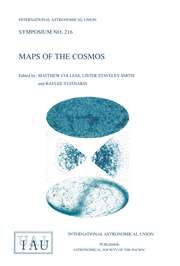No CrossRef data available.
Article contents
The Compared Efficiency Of Centering Algorithms
Published online by Cambridge University Press: 03 August 2017
Summary
The purpose of this study is to compare the quality of three digital image centering algorithms; 1) the fit of marginal distributions by Gaussian, 2) the maximum of the Autocorrelation of a stellar image by its symmetrical, 3) the 2–dimensional fit of stellar images by a mean stellar Profile.
The two main conclusions are: 1) the 3 centering methods give the same accuracy if the star is isolated, bright and unsaturated. But as soon as one of these conditions fails, fast algorithms lack robustness and the only reliable method is the 2-d profile fit, 2) preliminary tests on Schmidt plates digitized with the MAMA (Machine Automatique à Mesurer pour l'Astronomie) show that under the above restrictions, the centering algorithms do not alter the final astrometric accuracy, neither do the digitizing machine.
Information
- Type
- Part II: Current Research
- Information
- Copyright
- Copyright © Kluwer 1988

